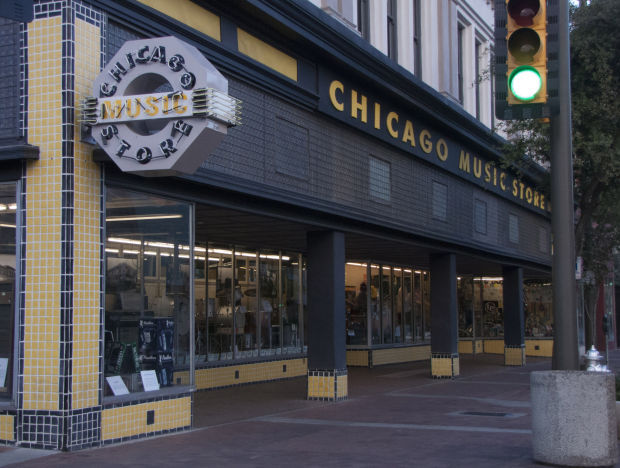In the latest in our series on architects and their favorite buildings, Jim Sauer finds a lot to love about the Chicago Music Store.
Buildings are acts of collaboration. Owner, designer, builder and user all contribute to the building. With a historic building such as the Chicago Music Store at 130 E. Congress St., the list of collaborators grows very long — too long to list here.
The building on the corner of Sixth Avenue and Congress Street was built in 1903 to house the Los Angeles Furniture Co. Its two longest-tenured owners have been the J.C. Penney Co., from 1927 to 1957, and the Chicago Music Store, since 1967. It was J.C. Penney that combined two buildings to create the current one.
You can see evidence of this combining looking at ceiling beams, window patterns, and the angle of the original pressed-tin ceiling tiles.
The last 15 years have seen a new ceiling structure, removal of decades-old paint from tile work, a listing on the National Register of Historic Places and a general overhaul of street façades.
There is a lot to love about this building. There are the quirky bits: the balcony that runs along the north wall that is so short I need to tilt my head; the partial basement; the not-quite-square angle where the walls meet, reflecting the angle of our downtown streets.
There are also the grand gestures of the building: the nearly 30 feet of open air from the ground floor to the skylights; the hierarchy of stairways; the generous ceiling height in the mezzanine; the sight lines from the top floor – to the mezzanine – to the ground floor; the shaded terrazzo-tiled “front porch” that is a gift back to the community, allowing for comfortable window-shopping and creating a performance space for local musicians.
But while I admire the history on display here, I also see vast potential in this building. Skylights could be reopened and more windows put in, including the return of the storefront windows along Sixth Avenue. The wonderful spaces of the mezzanine and second floor could again be fully opened to customers.
The Chicago Music Store makes me feel grateful for the efforts of everyone who worked together, across time, to create it. It also makes me feel hopeful that it will continue to receive love and attention so it can evolve, grow and continue to serve the needs of our community.






